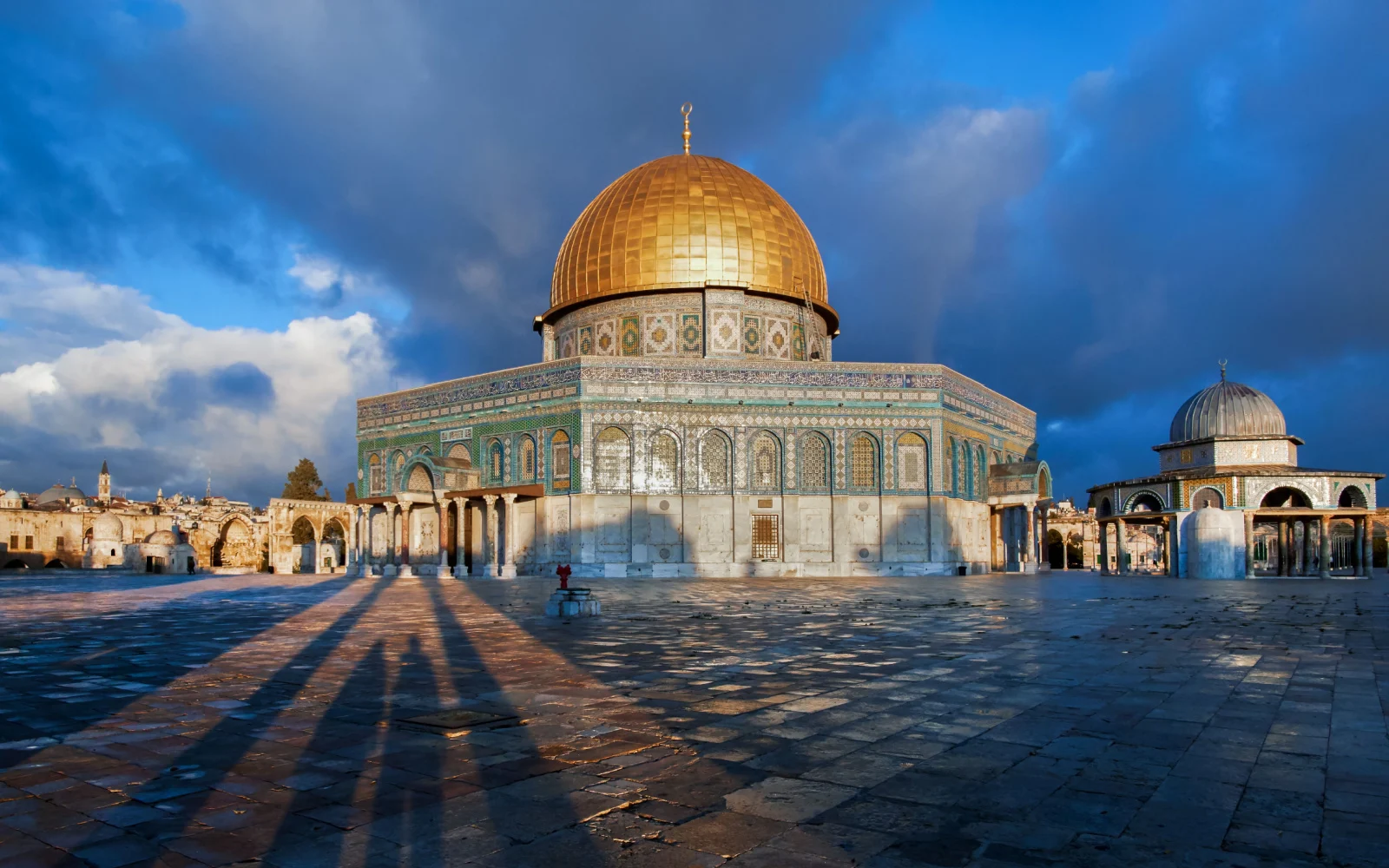The ancient land of Palestine still captures the imagination of many travelers. A few million people visit Palestine each year for various different reasons.
Palestine is an area with religious significance to many people, and thousands of Christians each year visit to go on pilgrimage to holy sites such as Bethlehem, the site of Jesus’s birth, and the monasteries of the Kidron Valley.
History lovers will want to visit archeological sites such as Jericho, the oldest city in the world. Others want to learn more about Palestinian culture by staying with a local nomadic Bedouin family or checking out the street art of the capital, Ramallah.
However, many more people know the country from news reports than from tourist itineraries. It has a troubled recent history and many problems, such as the ongoing Israeli-Palestinian conflict, terrorist attacks, and more.
In such an atmosphere, is it safe for foreign tourists to visit Palestine? This travel guide will help you prepare for the trip safely and accurately.
Read Next: Is Israel Safe to Visit? Our Take
Is Palestine Safe to Visit in 2024?
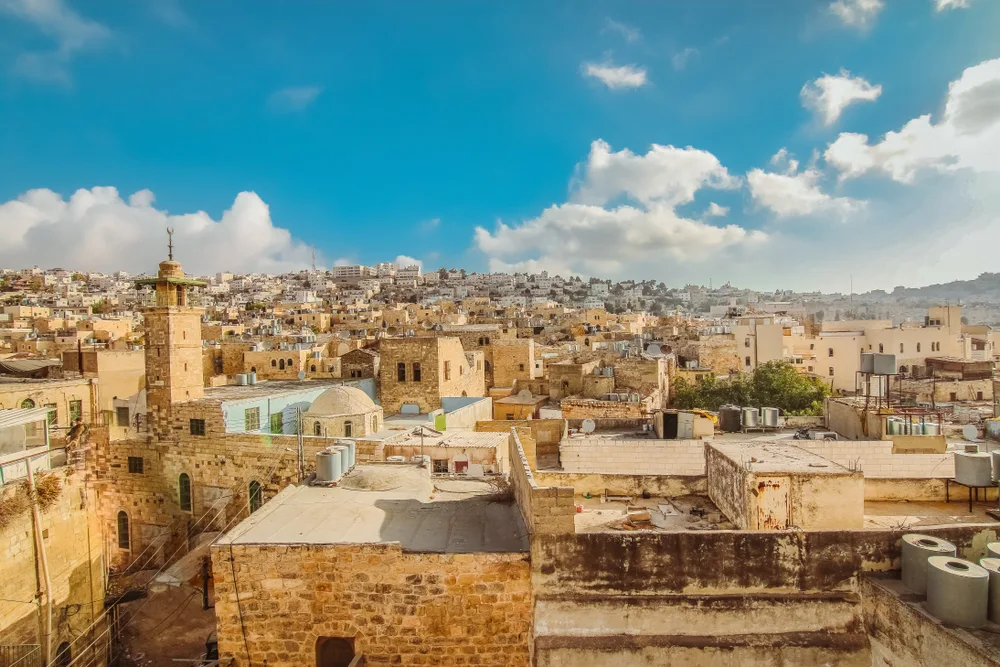
Nayef Hammouri/Shutterstock
No. Palestine is a safest place to visit at all, especially due to the ongoing war with Israel. Palestine is a place that you will need to take a lot of precautions to visit safely, and some potential travelers may decide to skip a trip altogether.
The country has a lot of challenges, and while thousands of people visit safely each year, the risk that you might encounter a problem while you are in town is fairly high, especially if you are unprepared.
A good place to start researching what you need to do to visit Palestine is to look at travel advisories. Most countries lump their travel advisories for Israel and Palestine together, so look for travel advisories for “Israel and the Occupied Palestine Territories” or “Israel, the West Bank, and Gaza.”
Countries also tend to issue separate travel advisories for the Gaza Strip and the West Bank. These two places are the two major regions of Palestine.
They are not even connected by a physical border, so they have very different security situations. Most countries agree that the Gaza Strip is unsafe to visit.
The New Zealand government advises its citizens to avoid all travel to Gaza and the waters off the coast of Gaza, and this warning is echoed by most other world governments.
There are a few reasons why Gaza is so unsafe, including:
- Frequent civil unrest
- Rocket attacks
- High risk of terrorism
- Kidnapping of foreigners
For the other major part of Palestine, the West Bank, the consensus on travel differs. The United States advises citizens to exercise increased caution in the West Bank, placing it at the same advisory level as Israel.
The Australian government advises citizens to avoid non-essential travel to the West Bank. Other governments, such as the UK government, advise extra caution in certain parts of the West Bank such as Jenin.
Many of the problems facing the West Bank are similar to the problems facing Gaza, such as:
- Civil unrest
- Terrorism
- Political conflict with Israel
- Violent assault
However, the problems happen at a far lower rate in the West Bank than in Gaza. Plus, violence tends to be intercommunal, or between forces of order and civilians, and rarely affects tourists.
It is impossible to think about the safety of traveling to Palestine without learning about the political situation in the area, such as in this quick explainer.
To this day, Israel and Palestine dispute territories and borders. It is common to run into Israeli military checkpoints in Palestine. Tensions are higher in border areas, areas that are still contested such as Jerusalem, and areas that have high populations of Israeli settlers such as Nablus.
Political demonstrations are common as many Palestinians are dissatisfied with the situation in their home and feel as if they are not treated fairly. Demonstrations often turn violent.
There are also frequent, sometimes deadly, clashes between Israelis and Palestinians. As a visitor, you do not want to get caught up in these clashes at any point as you don’t know what might happen.
If there is an announced demonstration, stay away from it. If you notice a crowd gathering, or shopkeepers shutting down their businesses, that is a good sign to stay away. For example, locals know that when shopkeepers in the East Jerusalem souk close their shutters, it is time to leave.
You definitely need to be aware of this situation when visiting Palestine, and not do anything that might put you at unnecessary risk. However, demonstrations and violent incidents rarely target foreigners, so keep that in mind.
Crime in Palestine
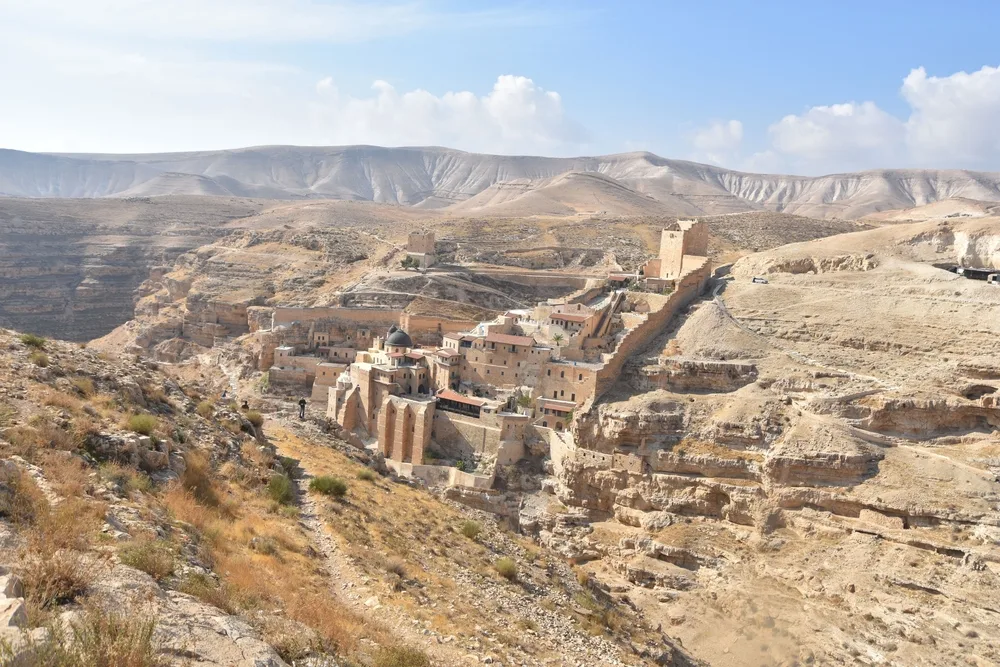
Ameer Qaimari/Shutterstock
Crime is a common concern for people traveling abroad, including to Palestine. Besides its political unrest, Palestine also experiences more mundane problems such as crime, although it is not usually the primary concern for visitors and residents.
The crime rate in Palestine is actually low to moderate, so you don’t have to worry too much about crime when you are in town.
According to official statistics by the Palestinian Authority, the overall crime rate is 1639.0 criminal incidents per 100,000 people. Different parts of Palestine have higher crime rates than others.
Governorates with the highest crime rates include Ramallah (which makes sense since the capital is also the largest city), Jericho, and the three governorates of Gaza. This area has a much higher crime rate than the West Bank, including a higher violent crime rate.
The most common offenses in Palestine tend to be minor crimes. One of the most common crimes is theft/robbery, which makes up about 18% of the total crimes committed. Another common crime is fraud/forgery, which makes up about 12.8% of total crimes committed.
The high rate of violent crime, especially in some areas, is concerning. The most common overall crime is assault, which makes up a whopping 24% of total crimes committed in Palestine.
Many of these assaults are connected to local civil and political unrest. Assault rates for certain parts of Palestine known for their troubled politics, such as Gaza and Hebron, drive up the totals for the rest of the territory.
Another area that drives up the overall crime rate in Palestine is Jenin, a massive refugee camp. Although the total crime rate is close to the Palestinian average, 1,264.3 incidents per 100,000 people, Jenin has the most instances of homicide and kidnapping in Palestine.
As you can see, crime statistics in Palestine differ greatly from region to region, so knowing where to avoid can help you stay safe. The crime rate overall is relatively low, and foreigners are rarely targeted for crimes.
Petty Theft
More violent incidents may grab the headlines, but the most common crime in Palestine is still petty theft. Thieves take advantage of distracted tourists and part them from their valuables.
The Canadian government mentions the risk of petty theft such as pickpocketing, bag snatching, and theft from vehicles in its travel advisory for Israel and Palestine.
Theft occurs in crowded areas where thieves can get cover for their activities from other people around and in areas popular with tourists.
Pickpockets often operate in the souks of East Jerusalem (which is under Palestinian control), in the streets of big cities such as Ramallah and Jericho, and around the popular pilgrimage sites of Bethlehem.
Although pickpocketing is present, it is rarer in Palestine than in many popular tourist destinations around the world. It is still a good idea to take basic precautions to protect your valuables.
Don’t leave them unattended or somewhere that a thief can easily access, such as a loose pocket. Put valuables in bags that are harder to snatch, such as cross-body purses, and don’t advertise that you have lots of cash on you.
Theft from vehicles happens sometimes in Palestine, but most tourists aren’t advised to rent cars because the driving conditions and needing to navigate frequent checkpoints are challenging for foreigners.
Terrorism
Unfortunately, it’s difficult to mention traveling to Palestine without mentioning the risk of terrorism. According to the New Zealand government’s travel advisory, the risk of terrorism is a near-constant threat when you are visiting Israel or Palestine.
There are many recent incidents, ranging from bombings to stabbings to vehicle ramming. Recent incidents include the August 2023 shooting attack on Palestinians in a village near Ramallah, and an attack on an Israeli settlement in the West Bank that killed two women.
Many terrorists use methods that affect bystanders — although foreigners are rarely directly targeted in attacks, you run a risk of getting caught in the crossfire.
You can minimize your risk of being caught up in a terrorist attack by avoiding areas that have a higher risk of terrorism. Attacks tend to happen near Israeli settlements in the West Bank, around refugee camps such as Jenin, and in cities with high levels of tension such as Hebron.
The Gaza Strip, which is controlled by Hamas, also has a higher incidence of terrorist activity, including kidnapping of foreigners.
There are also certain times of the year when the risk of terrorism increases. The Canadian government warns citizens that attacks increase around important religious holidays such as Passover, Rosh Hashanah, and Ramadan, and during public celebrations.
Monitor the news before your trip as political tensions tend to lead to terrorist attacks.
Avoiding Bad Areas
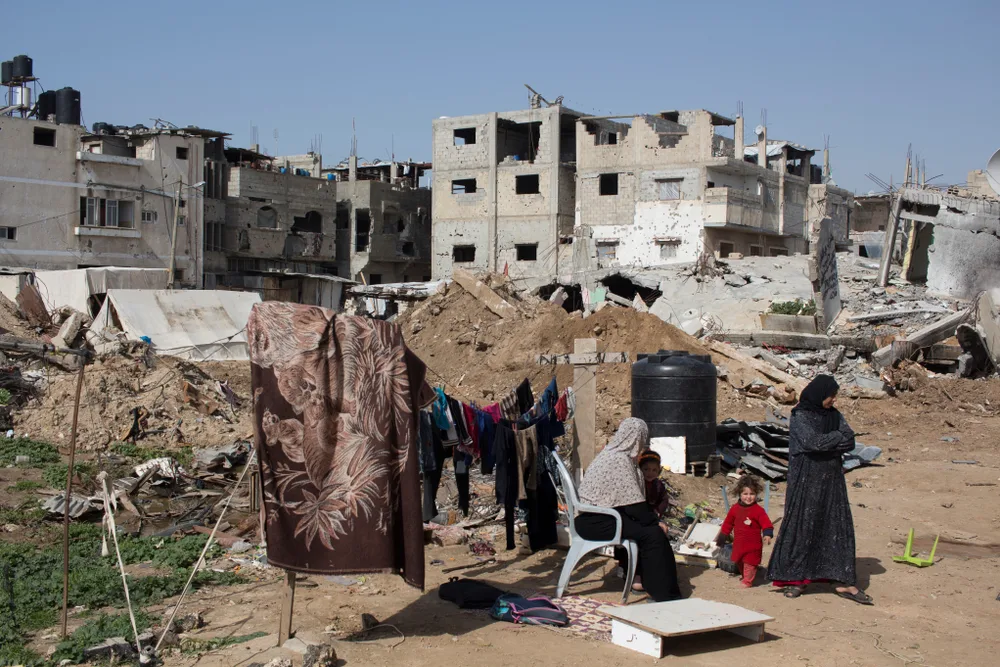
Shujayea, Gaza Strip/Palestine – feb 25 2015: Shujayea was a residential area in the Gaza Strip and sustained 4 days of continuous bombardment during Israel’s “Operation Protective Edge”/Federico Neri/Shutterstock
There are a few areas of Palestine that you should probably avoid during your trip. The Gaza Strip is dangerous for foreigners due to the high risk of kidnapping, terrorism, and civil unrest.
Visitors to the area are also affected by the same problems that locals face, such as frequent power cuts and shortages. Avoid any refugee camps in the West Bank, such as Jenin. They tend to have higher crime rates due to the desperation of the people staying there.
Hebron is another city with a dangerous reputation in Palestine. It is a divided city with frequent unrest. Nablus also is not the safest city in Palestine.
Things to Consider
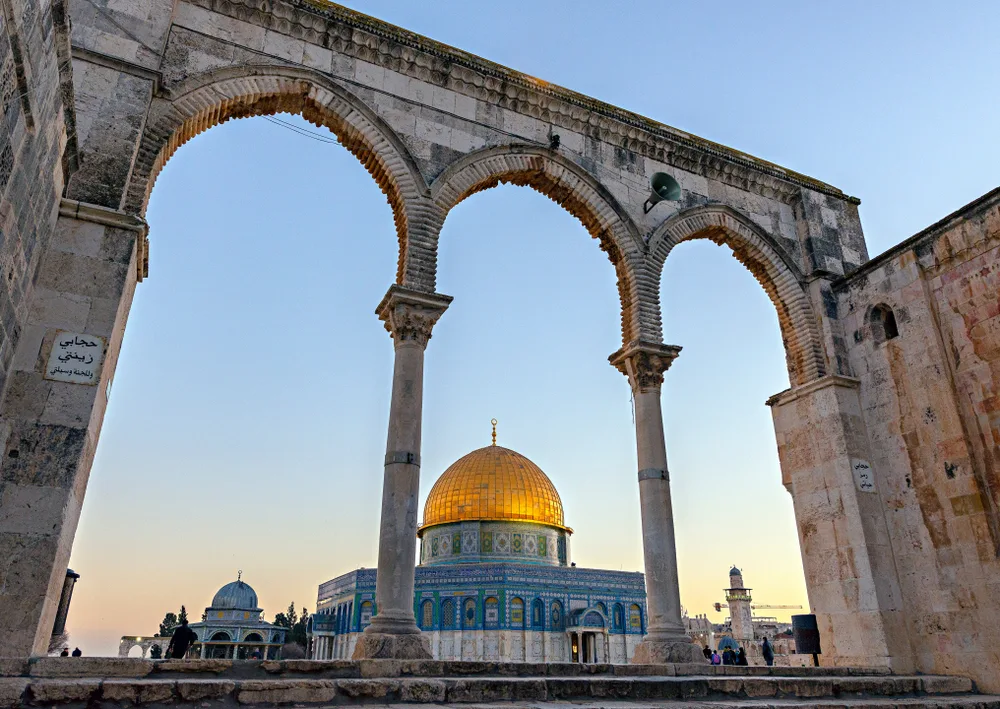
Sevde Sevan/Shutterstock
Here are a few additional tips for visiting Palestine:
- Don’t ask invasive questions about the Israeli-Palestine conflict. It is a sore topic for people on all sides. Avoid making political commentary, including on your social media while you are visiting, to avoid getting yourself into trouble.
- Always have your ID on you. Police and military checkpoints are common, especially when traveling between cities.
- Practice saying no. You may run into aggressive souvenir sellers or taxi drivers while in touristy areas such as Jerusalem and Bethlehem. Politely but firmly say “no thank you” (“la shukran” in Arabic) and ignore them, they will eventually leave you alone.
- Follow the advice of local authorities. Curfews and military actions can occur at a moment’s notice. If unrest happens while you are in town, remain calm and only leave your accommodation when authorities say it is safe.
Frequently Asked Questions
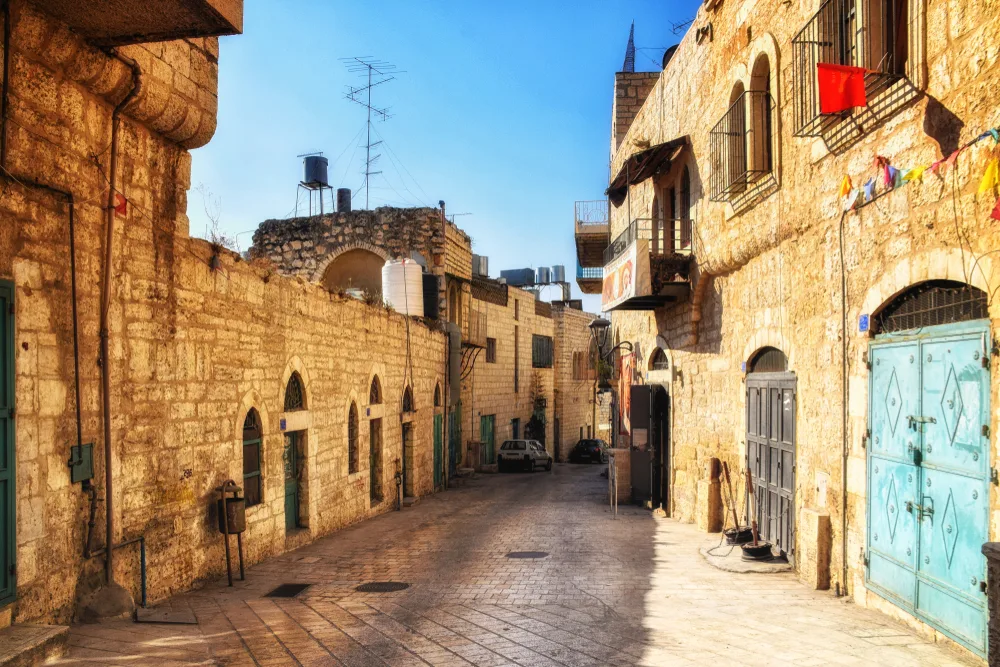
Atosan/Shutterstock
Here are a few other questions you may want to ask before visiting Palestine:
Can tourists visit Palestine?
Yes, tourists can visit Palestine, and many do so each year, including on organized tours. To visit Palestine, you usually need permission from the Israeli government and the Palestinian Authority.
Is Palestine safe as of today?
As of 2023, parts of Palestine are safe to visit with a high degree of caution. Due to the political situation in Israel and Palestine, political tensions have increased, but these events don’t usually affect visitors.
What areas of Palestine are safe?
Most of the popular touristy areas of the West Bank, such as Bethlehem and Jericho are safe. The capital Ramallah is also safe although you might encounter petty theft.
Is it ethical to visit Palestine?
The answer to this depends on your personal principles and political beliefs. In general, as long as you make a point of supporting locals through homestays and buying artisanal products, you can ensure a more ethical trip.
Is Gaza safe for tourists?
No, Gaza is not safe for tourists. The few foreigners that tend to venture there usually do so for professional or humanitarian reasons.
So, Is Palestine Safe to Visit?
It is possible to visit Palestine safely, but you will have to do your research and take plenty of precautions.
Problems such as civil unrest and terrorism sometimes affect tourists, but if you do your research on areas to avoid, or book an organized tour with a good company, it is possible to visit safely.
However, with so many other amazing countries to visit across the globe, why risk it? Book your trip to one of them today and experience all that each one has to offer. Happy travels!



